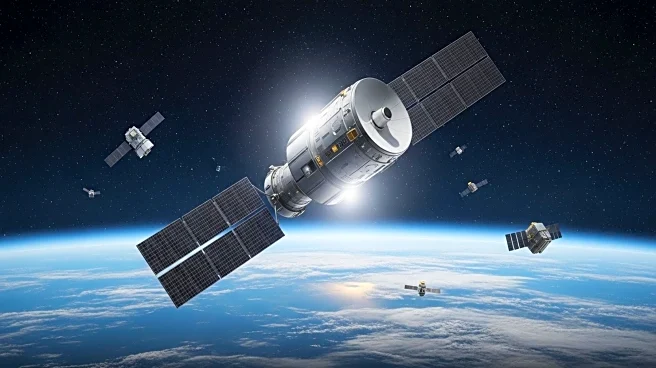What is the story about?
What's Happening?
China has significantly increased its low-earth orbit (LEO) satellite launch program, deploying 48 satellites in the past month. The recent launch involved a Long March rocket carrying ten satellites from the Hainan space center. This marks the sixth launch since July 27, primarily for China Starnet, a government-owned network. Both China Starnet and Shanghai Yuanxin are developing LEO constellations similar to Starlink, with Starnet booking 13,000 orbit slots and Yuanxin 15,000 through the International Telecommunication Union (ITU). The Ministry of Industry and Information Technology (MIIT) is preparing to issue five satellite Internet licenses, likely to major telecom operators and satellite service providers.
Why It's Important?
The acceleration of China's LEO satellite launches is poised to reshape global telecommunications by enhancing satellite internet capabilities. This development could bolster China's position in the satellite internet market, potentially challenging existing players like Starlink. The issuance of satellite Internet licenses by MIIT suggests a strategic move to integrate satellite services with terrestrial telecom infrastructure, which could lead to improved connectivity and technological advancements in 5G and 6G networks. The involvement of major telecom operators indicates a focus on maintaining industry dominance while expanding international partnerships.
What's Next?
China's continued satellite launches and the forthcoming satellite Internet licenses may lead to increased competition in the global satellite internet market. The structure of the industry remains uncertain, with potential roles for new satellite service providers as wholesalers or competitors to established telecom operators. The focus on international markets suggests that China Starnet and Shanghai Yuanxin will seek commercial revenues outside China, leveraging partnerships with countries like Brazil. The integration of satellite services with terrestrial networks could drive innovation in smart satellite connectivity and Internet of Vehicles (IoV) services.
Beyond the Headlines
The rapid expansion of China's satellite capabilities raises questions about the balance between government control and private sector competition. While the government aims to boost competition, the dominance of large incumbents may limit opportunities for smaller private companies. The strategic focus on international markets highlights China's ambition to extend its technological influence globally, potentially affecting geopolitical dynamics in telecommunications.
















